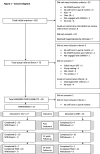Efficacy of Mentalization-based group therapy for adolescents: the results of a pilot randomised controlled trial
- PMID: 31170947
- PMCID: PMC6554935
- DOI: 10.1186/s12888-019-2158-8
Efficacy of Mentalization-based group therapy for adolescents: the results of a pilot randomised controlled trial
Erratum in
-
Correction to: Efficacy of Mentalization-based group therapy for adolescents: the results of a pilot randomised controlled trial.BMC Psychiatry. 2021 Mar 9;21(1):142. doi: 10.1186/s12888-021-03102-8. BMC Psychiatry. 2021. PMID: 33750324 Free PMC article. No abstract available.
Abstract
Background: Mentalization Based Therapy (MBT) has yielded promising outcomes for reducing self-harm, although to date only one study has reported MBT's effectiveness for adolescents (Rossouw and Fonagy, J Am Acad Child Adolesc Psychiatry 51:1304-1313, 2012) wherein the treatment protocol consisted of an intensive programme of individual and family therapy. We sought to investigate an adaptation of the adult MBT introductory manual in a group format for adolescents.
Methods: The present study is a randomised controlled single blind feasibility trial that aims to (1) adapt the original explicit MBT introductory group manual for an adolescent population (MBT-Ai) and to (2) assess the feasibility of a trial of MBT-Ai through examination of consent rates, attendance, attrition and self-harm. Repeated measures ANOVAs were conducted to examine change over time in independent and dependent variables between groups, and multi level models (MLM) were conducted to examine key predictors in relation to change over time with self-report self-harm and emergency department presentation for harm as the primary outcome variables.
Results: Fifty-three young people consented to participate and were randomised to MBT-Ai + TAU or TAU alone. Five participants withdrew from the trial. Trial procedures seemed appropriate and safe, with acceptable group attendance. Self-reported self-harm and emergency department presentation for self-harm significantly decreased over time in both groups, though there were no between group differences. Social anxiety, emotion regulation, and borderline traits also significantly decreased over time in both groups. Mentalization emerged as a significant predictor of change over time in self reported self harm and hospital presentation for self-harm.
Conclusions: It was feasible to carry out an RCT of MBT-Ai for adolescents already attending NHS CAMHS who have recently self-harmed. Our data gave signals that suggested a relatively brief group-based MBT-Ai intervention may be a promising intervention with potential for service implementation. Future research should consider the appropriate format, dosage and intensity of MBT for the adolescent population.
Trial registration: NCT02771691 ; Trial Registration Date: 25/04/2016.
Keywords: Adolescent; Group; MBT; Mentalization; Self-harm.
Conflict of interest statement
The authors declare that they have no competing interests.
References
-
- Chan Melissa K. Y., Bhatti Henna, Meader Nick, Stockton Sarah, Evans Jonathan, O'Connor Rory C., Kapur Nav, Kendall Tim. Predicting suicide following self-harm: systematic review of risk factors and risk scales. British Journal of Psychiatry. 2016;209(4):277–283. - PubMed
-
- Hawton K, Harriss L. Deliberate self-harm by under-15-year-olds: characteristics, trends and outcome. J Child Psychol Psychiatry. 2008;49(4):441–448. - PubMed
-
- Hawton K, Saunders KEA, O'Connor RC. Self-harm and suicide in adolescents. Lancet. 2012;379(9834):2373–2382. - PubMed
-
- Borschmann R, Becker D, Coffey C, Spry E, Moreno-Betancur M, Moran P, Patton GC. 20-year outcomes in adolescents who self-harm: a population-based cohort study. Lancet Child Adolesc Health. 2017;1(3):195–202. - PubMed
Publication types
MeSH terms
Associated data
LinkOut - more resources
Full Text Sources
Medical


